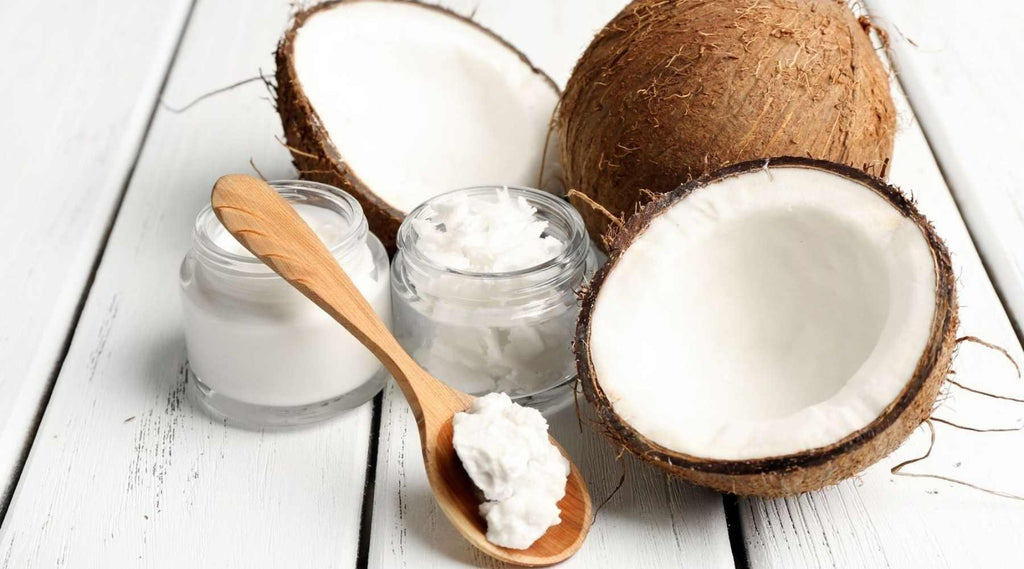
The more you look into a plant-based diet the more you will run into coconut cream. This is because it is such a delicious & versatile key ingredient perfect for a variety of dairy-free, plant-based, and vegan recipes.
Creamy desserts probably come to mind when you think of using coconut cream but it is actually used in many other recipes such as curries, soups & sauces. Other than tasting delicious it actually contains many nutritional benefits.
What is coconut cream?
When opening up a can of coconut milk/cream can you may notice the top consists of a thick cream (coconut cream) and the bottom is more of a watery consistency (coconut milk).
Although coconut cream and milk are made up of the same ingredients the coconut cream consists of less water and a higher fat percentage being more commonly used for creamy/whipped recipes like dairy-free whipped cream or ice-cream.
What is the difference between Coconut Water and Coconut Cream/Milk?
It may be a tad confusing as there are a lot of coconut products on the market. Coconut water has its own potential benefits as well, but is different from coconut cream/milk. Firstly, the water comes from a young, green coconut whereas the flesh from mature, brown coconut is used to make the cream/milk.
For comparison, here you can read in the product descriptions what coconut water is, and what coconut milk/cream is.
Nutritional facts about Coconut Cream
The nutritional value of coconut milk/cream can vary since there are many different brands. As well, you can choose between coconut milk/cream light or regular. The light version usually contains less fat which results in fewer calories. The macronutrient that the majority of the calories come from is fat.
Coconut cream is high in potassium
Potassium is one of the most important minerals in the body. Maintaining fluid balance, transmitting nerve impulses and contracting muscles are all actions in which potassium is involved in.
Getting enough potassium in your diet reduces the risk of high blood pressure, fatigue and muscle cramps. You may be familiar with potassium in sports drinks as it is an electrolyte, therefore coconut cream also contains electrolytes which contribute to a properly hydrated body.
Coconut cream may help with cholesterol levels
There are not many studies that have been conducted to determine this fact. There is one study that found that coconut helped raise HDL levels “good cholesterol” and lowered the LDLs “bad cholesterol.” Having a decreased level of LDL cholesterol indicates a lower risk of health problems like heart attack or stroke.
Coconuts contain healthy fats
Most of the fats in coconuts, and coconut cream, are saturated fats. Saturated fats have a bad rap, but that’s not always the case. Most of the fat found in coconut cream is made up of medium-chain triglycerides, also commonly known as MCT. MCT fat is far better for our bodies than most other types of saturated fat.
What are MCTs:
MCTs are a type of saturated fat. They are different from other saturated fats because of their shorter chain of carbon atoms. Due to their shorter length, MCTs are rapidly ingested. Rather than leading to some of the health issues associated with other saturated fats, MCTs come with potential health benefits of their own.
Some benefits of MCTs:
MCTs and MCT oil have been gaining popularity due to their various uses and potential benefits.
MCTs are a good energy source
The absorption and transportation of MCT oils throughout the body are quicker and easier than other saturated fats. MCT oils can directly go to the liver where the transformation into ketones takes place. Then they can be used as an immediate source of energy, which in turn can enhance exercise endurance and increase metabolism.
MCTs may promote increased satiety that may result in weight loss
Although more research is needed to fully prove this fact there are a couple reasons as to why MCT oils can increase satiety and potentially promote weight loss. Consuming these MCT oils results in releasing two hormones that regulate hunger: leptin and peptide YY.
When MCT oils are added to your diet you may feel fuller or more satisfied for longer resulting in eating less. In addition, this oil may improve your gut environment, which could also help you lose weight.
MCT may help with diabetes
In one study it was found that MCT oils may help with insulin sensitivity in type 2 diabetes.
Other potential benefits of MCT oils:
- A tool used to fight yeast and bacteria growth
- Could help manage blood sugar levels
- May reduce the risk of some heart disease
Overall, there are many benefits in consuming MCT oil. For further help in considering adding MCT oils into your diet you can always talk to your doctor or a nutritional profession.
And That’s a Wrap
Using coconut cream/milk not only provides a great substitute for dairy cream, but is proven to have a variety of potential benefits. Not to mention it tastes divine!
You can check out the variety of Coconut Cream we offer here at PlantX!




